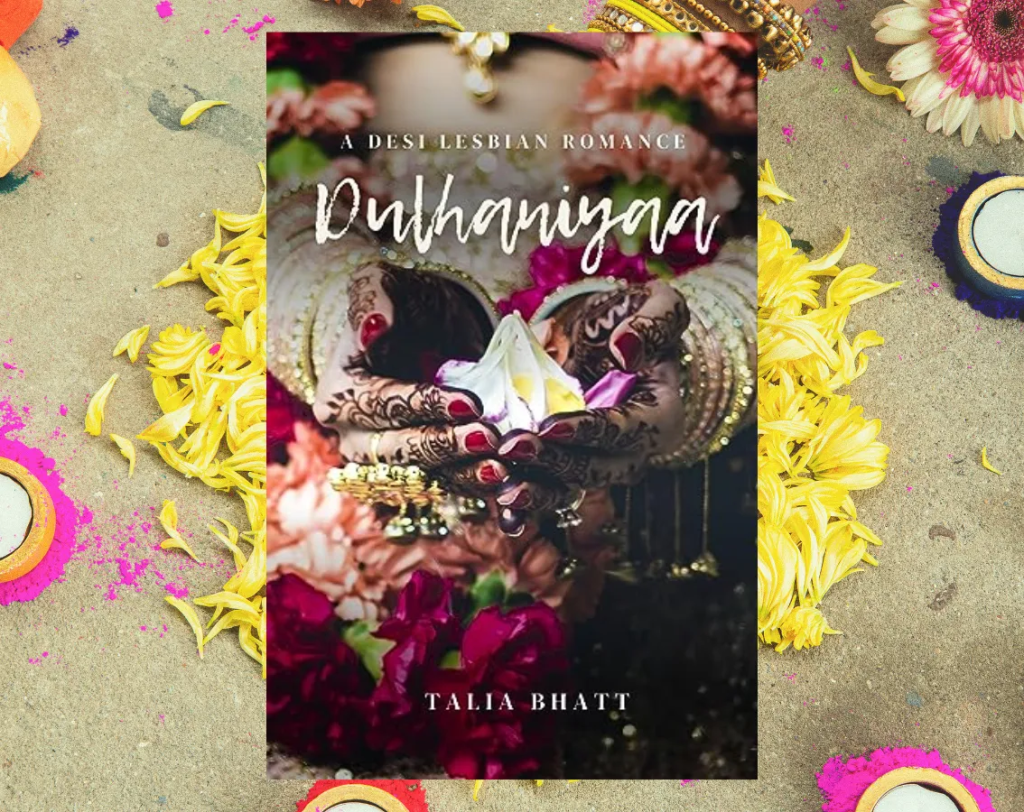
If you have watched Crazy Rich Asians, you’ll have a very good idea of what to expect in the opening pages of Dulhaniyaa, where the protagonist Esha comes home to Mumbai from America—the extravagance, the street food, the marital promises in the air. Unlike Crazy Rich Asians though, this is a queer story, and one of the very small handful of romantic comedy novels published in English by a desi trans lesbian.
It wears, then, its politics on the sleeve: the dance instructor Billu, vivacious and larger than life, is Esha’s love interest and a trans woman. Esha herself meantime must navigate the politics of the diaspora, the complexities of homecoming, and most of all the repression of her sexuality—she is a lesbian but, after her ex-girlfriend (also desi) resigned herself to patriarchy and arranged marriage, Esha lost hope and gave in. It’s time to grow up, she is told, and submit to compulsory heterosexuality. There’s no future in the life she really wants for herself. In this regard, while the book nods to romcom conventions, it’s not really comedic at all: if anything it’s quite sad, all the more so because Esha has seen her own future in her parents’ arranged marriage—loveless, estranged, quite literally separated by continents because her father doesn’t care to remain in India.
“Jab main chota, I mean, sorry, choti …” Billu trailed off and shook her head slightly, gathering her composure. “Dancing … was the only way I could express myself as a … child, Esha ma’am.”
Unsure of what exactly Billu meant, but realizing that it was a difficult topic for her to broach, Esha nodded.
“It was fine when I was doing the bits of both,” continued Billu, drumming her fingers on the table and staring determinedly at her own knuckles. “Lekin … I never pictured myself as the hero, Esha ma’am, you know? Always the heroine, but that was a problem. That was not allowed.”
In a fraught conversation, Billu and Esha come out to each other, revealing to each other their queerness—a queerness that they both know will be subsumed by compulsory heterosexuality, with Esha’s marriage in the wings. It’s heartbreaking, a deep engagement of the difficulties of not just gender relations but the crushing weight of heterosexuality as a regime: Esha, despite everything, feels a duty and attachment to her family. ‘I cannot clasp your hand in mine and turn to the world, to our families,’ her ex-girlfriend tells her in an email that has haunted her since their break-up. ‘We are not Americans, Esha, no matter how much we sound like them.’
Between all this, there’s a lot of love and warmth poured into the descriptions of the city, so much so that the book doubles as a love letter to Mumbai: not just its streets and architecture, but its street food, which itself serves to score many of the book’s emotional beats. More than anything Dulhaniyaa is deeply steeped in culture, from the melodious Hinglish dialogue to musings on gender segregation, and it is relentless in both how it treasures and critiques that culture.
Because this is romance, there is a happy ending—even though the path toward it is so painful and difficult. ‘No one fights for women like me, Esha,’ Billu tells our protagonist, and she’s right: no one fights for trans women. The book concludes on a note of joy, but it’s not one that many western books would have ended on—there is no easy acceptance, no wholesale embrace from Esha’s family (quite the opposite: she and her arranged groom—who also turns out to be gay—may have to enter a marriage where they’re each other’s beard); both she and Billu must contend, on and on, with the forces that would see them miserable or dead. But happiness, the story promises, is still possible, and they will be each other’s strength.

You must be logged in to post a comment.